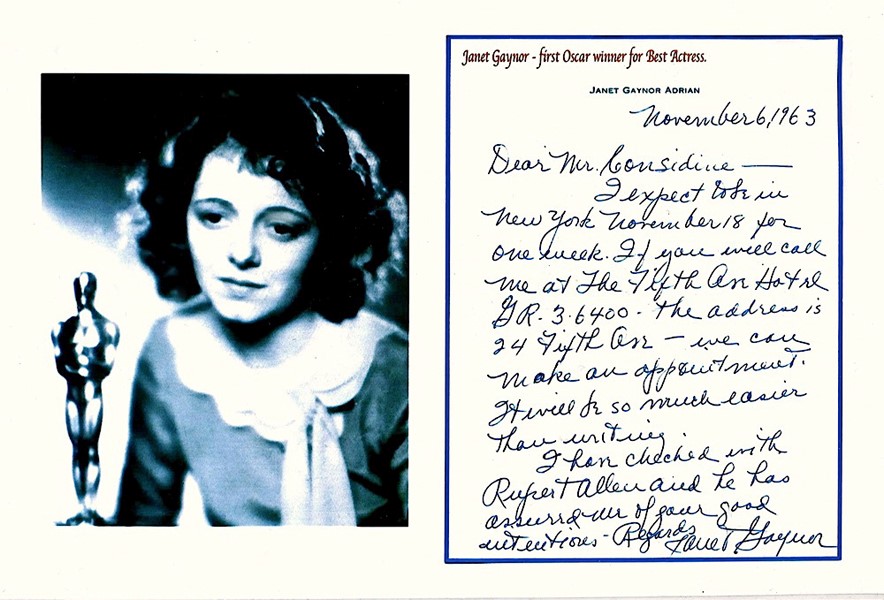The latest issue of AnOther Magazine exclusively showcases a remarkable collection of Oscar Letters from award winners since the awards first began in 1929, curated by writer Shaun Considine. In 1963, he wrote to the award winners and over the
The latest issue of AnOther Magazine exclusively showcases writer Shaun Considine's remarkable collection of Oscar Letters from award winners since the awards first began in 1929. Over the course of 10 months in 1963, he accumulated candid and riveting letters and personal interviews, shedding light on the glamour and mystique of the annual Academy Awards. In the wake of last night's 83rd ceremony, AnOther speaks to Considine about his extraordinary project.
What made you decide to revisit and publish The Oscar Letters now?
I came across the letters and became newly fascinated by them. I discovered how they could framed within a new story and format.
How many years did you continue the project over, and between which dates? What else were you doing at that time?
I started in February 1963 and continued up until President Kennedy was killed the following November. I wrote two or three more letters after that, and did one or two more interviews with James Cagney. Then I stopped as the culture and publishing industries were changing rapidly. At that time, I was also working at Columbia Records in Manhattan, as the Co-ordinator of New Releases. It was a terrific job, co-ordinating the release of all new music from Columbia artists, such as the young Bob Dylan, Aretha Franklin, Leonard Bernstein, Johnny Cash, Leonard Cohen and Janis Joplin. The 1960s was a colourful, exciting, tumultuous period, and I was at the heart of all of it. The Letters really do provide an alternative documentation of Hollywood at that time.
Why do you think the award winners were so obliging?
I still ask myself that question. It couldn't have been merely luck on my part, or any charm of persuasion in the letters I wrote. I believe it's because I asked about the most important thing in an actor's life, in everyone's life: the work they loved. Also, being recognised, awarded an Oscar, or any prestigious prize, is a highly emotional experience; for the recipients and for the viewers. There can be high drama in those moments, not easily forgotten. The Europeans – Simone Signoret, Sophia Loren and others – remembered it vividly and were happy to share it. Also, Princess Grace; it was a tremendous coup getting to interview her. She was the first Oscar winner who agreed to participate, and she and her press agent, Rupert Allan, were enormously supportive and helped getting some of the others – David Niven, Frank Sinatra, Alec Guinness and William Holden – to contribute.
Do you think that if you were to do this project now it would be the same?
I think so, as the same emotions are there – the love of the work, the thrill of the recognition of the work. However, getting to the winners and having them speak so openly might be a much larger challenge today, as most stars are protected by press agents and security. However, I believe, when all egos are put aside, good work and real communication can follow.
Did you learn things that particularly surprised you? Are there any questions that you wish you had asked in hindsight?
Many things surprised me. The depth of the research and submersion of the actors into the characters they played. Also, the candidness and humour about themselves, especially in the stressful situation they were faced with. Plus, how intriguing the race could be. As for the questions, I'm still amazed I was bold enough to ask the ones I did – if they wanted to win, who they believed their main competition was, what they knew about the politics of Oscar campaigning, their preparation for the big night and how they really felt at that critical moment of the final announcement. What cheek to enquire about all that! But clearly, while respecting each one, I wasn't, as the expression goes "sucking up" to the stars or to the star system. Which surprises me today as I really believed that back then I had been something of a dim and shallow youth.
What is it about cinema and the Hollywood system that particularly fascinates you?
There was a greater myth about Hollywood when I was growing up. It was the place where stars and magic were created. There were also the directors, Alfred Hitchcock, Elia Kazan, Billy Wilder, Joe Mankiewicz, George Stevens and others, who brought us classics such as A Place in the Sun, All About Eve, Sunset Boulevard, On the Waterfront, Rear Window and Some Like It Hot. The stars were unique too – Marlon Brando, Montgomery Clift, Grace Kelly, Cary Grant, Audrey Hepburn – each with their own style and distinct voices. Not easily found today, because apart from British performers such as Carey Mulligan and Tom Hardy, most of the film actors of today look and sound the same, with a few exceptions such as Cate Blanchett and James Franco.
Interview by Caroline Lever
